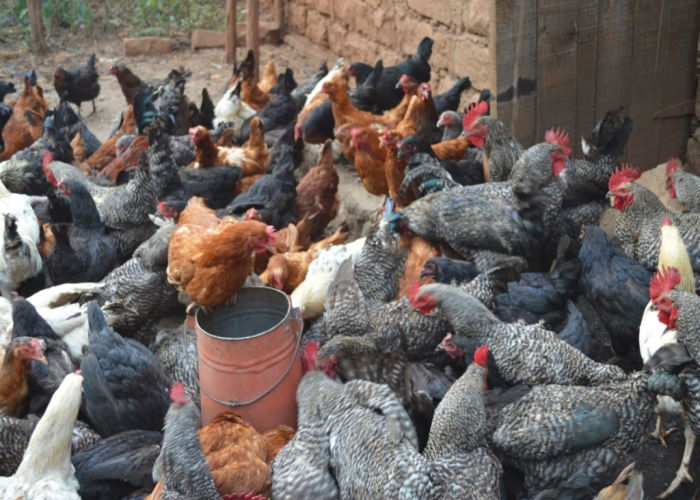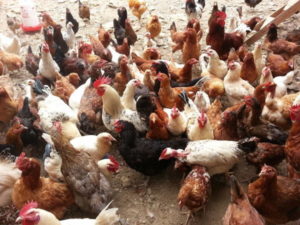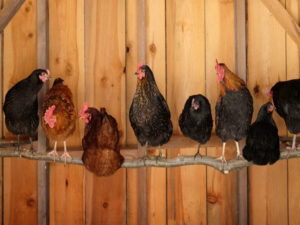
Local chicken is a bit easy to rear now days compared to the past since they can now reproduce with less management and can survive on their own.
There are many things that one can do in order to start rearing local chicken and we all have many questions like how do I start, what is needed and will I gain profits from all chicken. The answer is yes and no, if you take care of your chicken in a good way then yes, you will gain and yes you will make loses but the best thing to do is never give up and persist.
Many people are biased against rearing the local type of chicken because we all have the mentality that they take long to grow and the returns from the local chicken are hard to make but the reality is different from what we know. Once you start rearing them, you will find that they are the easiest to rear since they can easily get themselves food and in the long run you can earn more than what you bargained for.

And before you start complaining about the local breed, below are some questions that are normally asked and the answers that you need to know before starting to rear the local breed in Uganda:
This is not an easy fit but in order to start rearing local chicken, you will need to know the following;
- How To Collect Eggs
A farmer will need laying nets if they want to collect the eggs undamaged. You need to collect eggs on a daily basis and to ensure that the embryo grows properly, they should be stored with the broad ends facing upwards and you need a dark, safe and dry place for the laying and hatching of the eggs. When the eggs are laid, mark them with a simple mark showing when they were laid but do not use a marker since the ink might go into the egg spoiling it. The eggs should be kept in an aerated dry place to avoid easy rotting.
- The Chicken House
Housing space will be needed and it should be big enough to avoid congestion of the chicken and it should be well ventilated.
The housing should have perches where the chicken roosts during the night.
The house should be raised in order to avoid attacks from the predators.
Brooder baskets for the chicks can be made.

An example of a perch for chickens to roost
- Feedings
Feeding and water containers will be needed before starting the poultry rearing. The chicken need a well balance diet filled extra meals apart from feeds like; greens, maize, left over foods and you will get well fed chicken at the end of the day. The feedings should be fresh and clean without dirt as contaminated food will cause the birds to get sick.
- Vaccination To Avoid Random Diseases.
Chicken mostly falls sick during the first few weeks of after hatching and many farmers end up making a lot of loses due to too much chicken dying. So to avoid all this you need to have vaccines available for the chicken. These vaccines can be got from vet shops or you can hire a vet to come and vaccinate the chicken.
- Cleaning The Chicken House
Coffee husks or wood cuttings will be needed in order to protect the floor of the chicken house protected from the droppings and it makes it easy to clean the house. The husks hold down the droppings till they dry and can be used as manure.
- Selection Of Chicken
Finally you will need only one cock for every tens to provide enough eggs and chicks. You should be one that does looks after the chicks well and does not abandon the eggs during the hatching process.
So now the feat seems easier with the above tips. However there are still questions that need to be satisfied for the above farming venture to succeed like;
- What Is The First Step Towards Rearing?
Hatching The Eggs
When hatching eggs you can use the mother hen or an incubator. Make sure the number of eggs that are being given to the hen are equivalent to the size of the hen and to make sure that the eggs are hatched at the same time, delay the fastest hen for brooding by providing one egg to them as you wait for other hens to also become broody.
The Egg Selection Process
You should not choose eggs that are too big, cracked, too pointed, too spherical, oval and small ones. The eggs that should be chosen should comfortable for the hen to sit on for a good hatching. Turn the eggs regularly when in the incubator and you should use eggs that were laid in the past 14 days.
The Brooding Process
Brooding is majorly done by the mother hen, charcoal stove, kerosene brooder placed in a container mainly a metallic one. You can use other heat sources like a lantern, foster hen or a heat brooder for the chicken by placing it in a well-ventilated box placed in a wood shaving to provide heat to the chicks.
- What Are The Best Conditions For Hatching The Eggs?
The room that is to be used for hatching should be well ventilated, noise and you should make sure that the eggs are fertilized by the cock and the humidity should be favorable. Check the nest for parasites from time to time and you should make sure that the hens are fed well and have enough to drink and the hens should also be free from diarrhea.
The Rearing Of Chicken
Vaccinate the chicks when they make four days to avoid the New castle disease and also allow them to roam around. The chicks should be fed with soft food like crushed cereals or maize husks and water for drinking should be available all the time in clean troughs.
- What Are The Qualities Of A Good Hen And Cock?
A good hen should have straight toes, legs with no scales, a red comb, a not so sharp breast born, clean nostrils and beak and lively.
A good cock should have straight legs it should be protective and alert in nature, have shiny eyes, larger than a sizeable hen and should have large clean feathers that are around the vent.
Why Should I Rear Local Breeds?
The initial investment for the star up of rearing local breed is less compared to other breeds. Whether you need them for either domestic or commercial it’s always cheap.
The local breed does not need a lot of supervision especially when they are let loose and they can also be fed on cheap local food that is readily available.
The droppings from the chicken are high in nutrients and they can be used for manure in gardens, used to make food for fish and can also be given to animals as feeds.
The local chicken has a lot tolerance to the natural hazards like diseases, weather and other conditions and the market for both the meat and the eggs for the local breed are always readily available and people prefer the local breed to the exotic ones.
The local breed can be reared for both meat and eggs and the beauty is that this can be done in the same place and in small space. Most Ugandans love the local eggs saying they are tastier than the eggs from the exotic hens.
The eggs need a lot of work so that they don’t spoil easily like keeping them in a dry place, storing them while the pointed part should face upwards, the eggs need to be checked regularly to ensure that the embryo is not spilt and in case they are spoilt, make sure you separate them from the rest so that the rest are not affected.
To avoid disease attacking the chicken, you should wash the feeders every evening and change the food, use good quality mixed food and you should keep the chicken house clean and dry by avoiding pouring water inside the house.
There are very many vices among chicken and to control these vices one needs to isolate the birds that have the vice of eating eggs and they should be fed at specific intervals. To avoid infestation, the birds should feed from the hatchery and you should also monitor the chicken so that they do not fight with each other and the egg eating chicken should not be allowed to hatch again.
The eggs in the incubator need to be checked after seven days to see those that are fertile and those that are not. Those that are not fertilized have red veins and they can easily be seen through the dim light from the incubator and they should be removed with immediate effect.
And in conclusion the trick to getting exactly what you want from rearing local chicken is to feed them well on a good diet, provide good hydration and keep the chicken house clean. Good luck with rearing your chicken.

11 Replies to “Local Chicken: Rearing Tips on Success In This Venture”
I have local chicken and I want them lay eggs nonstop like the exotic breed
The breed of the chicken can not favour then to lay non stop, you will have to get the exotic laying chickens or cross breeds the laying breed with the local
I would like to start, but locals and kuloilers what’s the best one to adventure in?
They say kroiulers is good because it grows very fast ….but they don’t say it eats much too.
According to a small comparison interns of gain per year between locals and kroiulers chickens, I have decided on my own to venture in locals, but starting with a reason number, they feed less, resistance and no pressure in sales
its gud for me to understand….thnx😊
can the local chicken freeely move out of their house and come back in the evenning and can they be eaten by small cats?
thank you
Yes to all
Yes, local chicken can freely walk in and out of their house and yes they can be eaten by some bush animals and birds like an Eagle. However, I recommend that if you’re passionate about rearing local chicken, please go for it you will manage. I personally started it as a side-hustle but it’s paying off steadily
Well put, on my to local chicken rearing when I get there is will do exactly what I have learned. AWESOME thank you so much
I have local bird, and I want them to be producing eggs non stop. What can I do?
Thanks so much.i started with some few birds but with your guidance hope to improve and earn some money